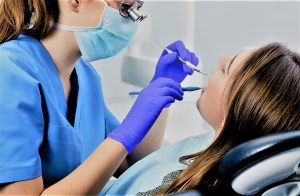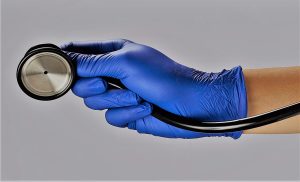For anyone working in the medical field, the use of gloves is pivotal because they offer protection against hazardous encounters, including blood-borne viruses, infectious diseases, and other hazards. Our guide will help medical professionals in picking the most appropriate gloves for their work by providing information on the many kinds of gloves as well as the considerations that should be made when choosing between them.
Factors to Consider When Choosing Medical Gloves
While selecting gloves, medical professionals should take a number of variables into consideration, including the level of protection offered, comfort, and fit. These factors are also correlated with the materials used to make the medical gloves. Even though medical gloves are strictly regulated, you’d still find a decent variety of products in the market.
1. Protection Level
Gloves offer a certain level of protection based on how well they stop the spread of diseases, chemicals, or other hazardous substances. Medical gloves can be made from different materials, such as latex, nitrile, or vinyl, and each one protects against different risks in its own way.
For example, nitrile gloves are recognized to be more resistant to chemicals than latex gloves, but latex gloves are more sensitive or tactile. Doctors and nurses need to make sure that the medical gloves they choose offer enough protection for the task at hand. They should think about things like the thickness, how long it will last, and how resistant it is to tears, punctures, and chemicals.
2. Comfort
It’s important to think about comfort because doctors and nurses may have to wear gloves for long periods of time. Comfortable medical gloves can help keep your hands from getting tired, irritated, or hurt, which can affect your performance and endurance when handling patients. The thickness, flexibility, and breathability of gloves are all things that affect how comfortable they are to wear. Also, gloves shouldn’t have any powder on them to stop irritation and allergies.
3. Fit
A medical glove’s fit refers to how well it fits the shape of the hand that wears it. Fit is very important if you want to be as safe, comfortable, and nimble as possible. Medical gloves that are too big can easily fall off, while the ones that are too small can be uncomfortable and make it hard to move your hands.
Gloves should tight-fit but not too tight, and they should be tactile and flexible. When choosing gloves, people in the medical field should think about things like hand size, finger length, and glove size. Check the manufacturer’s size chart when purchasing a box of medical gloves.
4. Materials
Latex, nitrile, and vinyl are some of the materials that are used to make medical grade disposable gloves. Most medical gloves available in the market are made of these materials even though some other variations might also appear. These materials have their own advantages and drawbacks.
- Latex: It’s usual practice to wear gloves made of latex, however, some people have sensitivities to the material. It’s not recommended for medical workers to use latex gloves if they and/or their patients are allergic to this material.
- Nitrile: These are an excellent choice for persons who are allergic to latex and offer superior resistance to chemicals. Nitrile gloves are a straightforward alternative to latex medical gloves but they’re also the most expensive ones in this category.
- Vinyl: These are quite inexpensive, but they don’t offer much in the way of protection from dangerous chemicals or infections. Still, vinyl gloves are a cost-effective solution for low-risk medical applications.
Types of Medical Gloves
Different types of medical gloves are available in the market, each with its own set of features made to meet different needs in healthcare and medical applications. Healthcare workers need to know the differences between these medical gloves so they can choose the right ones for their jobs.
Exam Gloves
Exam gloves are single-use gloves that are often used in hospitals and clinics for routine exams, blood draws, and procedures. As previously explained, different materials, like latex, nitrile, or vinyl, are used to make these exam gloves. They offer protection against contamination, bacteria, and other infectious contacts.
- Latex exam gloves: These gloves generally have a high level of dexterity, sensitivity, and flexibility which makes them a great choice for more complicated procedures that require a high level of tactile sensitivity. But some people may be allergic to latex, so exam gloves made of nitrile and vinyl are a better choice.
- Nitrile exam gloves: They are better than latex or vinyl gloves because they are more resistant to chemicals and punctures. This makes them a good choice for medical procedures that involve dangerous materials.
- Vinyl exam gloves: These gloves are the least expensive choice and are often used to protect against infectious agents but in low-risk situations.
Surgical Gloves
Surgical gloves are the specific type of gloves that surgeons wear during surgery to prevent cross-contamination between the surgeons and their. Most of the time, these gloves are made of latex, neoprene, or polyisoprene, and they don’t have any powder on them to keep dust from getting inside.
- Latex surgical gloves: Are often used in surgery because they are very sensitive and fit well. surgeons and patients who are allergic to latex may have bad reactions.
- Neoprene surgical gloves: For people who are allergic to latex, neoprene surgical gloves are a straightforward alternative to latex surgical gloves. They are also stronger than latex gloves when it comes to chemicals and holes.
- Polyisoprene surgical gloves: These gloves are as sensitive and fit as latex gloves, but they don’t have any latex proteins. This makes them a good choice for people who are allergic to latex.
Gloves for Chemotherapy
Chemotherapy gloves are a type of medical glove specifically designed to protect both people giving and receiving chemotherapy. These gloves can be made of nitrile or neoprene, and they don’t have any powder on them to prevent possible contamination
Chemotherapy gloves are typically thicker than exam gloves and are made to protect against hazardous chemicals and drugs used in the procedure. Most of the time, these gloves are longer than other medical gloves to protect longer parts of the hands.
Generally speaking, it’s important to choose the right kind of medical gloves to keep healthcare workers and patients safe and healthy. By knowing the differences between exam gloves, surgical gloves, and chemotherapy gloves, you as a healthcare worker can choose the best gloves for medical jobs, ensuring proper protection and reducing the risk of contamination and/or cross-contamination.
3 Best Gloves For Medical Professionals Review
1. MedPride Powder-Free Nitrile Exam Gloves
MedPride Powder-Free Nitrile Exam Gloves are undoubtedly a comfortable and long-lasting choice for people who need gloves for medical or professional use. Because they are made of nitrile, these gloves are great for people who are allergic to natural rubber latex and putting on powder. The gloves are sold in packs of 100 and are a medium size.
One of the best things about the MedPride gloves is how well they fit. This is made possible by the fact that they can stretch and are very strong. They are made with textured fingertips to give the wearer a good sense of touch, so they can handle fine instruments and objects with better accuracy and precision.

The gloves are a stylish iris blue color that is also very useful. They are often used by professionals like the police force, tattoo artists, doctors, and those first responders. Their smooth outside and beaded cuffs make them even more durable, making them perfect for everyday use.
Uses more Mechanics: best Nitrile Gloves For Mechanics.
The MedPride Powder-Free Nitrile Exam Gloves are also made to be easy to throw away, which makes them a good choice for medical professionals who want to stay clean. Their lack of powder makes them less likely to cause allergies or irritations in the wearer or anyone else who touches them.
Generally speaking, the MedPride Powder-Free Nitrile Exam Gloves are a good choice for anyone who needs gloves for medical or professional use. Because they are comfortable, durable, and have useful features, they are versatile solutions for healthcare workers.
2. The Med PRIDE Vinyl Medical Exam Gloves
The Med PRIDE Vinyl Medical Exam Gloves are another good choice for anyone who needs to handle bodily fluids or serve food while wearing gloves. The gloves don’t have latex, so they are great for people who are allergic to latex. The gloves are a clear color and a big size, so they will fit well and keep your hands safe.
The gloves are made of rubber, vinyl, and polyvinyl chloride, which makes them stronger and last longer than either nitrile or latex gloves. The 4 mils of thick PVC gives the user more control and dexterity when handling needles or other delicate medical equipment.
The gloves can be used in a wide range of commercial or industrial settings. This makes them perfect for emergency workers, people who care for people at home or in hospices, lab technicians, elder care professionals, veterinarians, healthcare workers, and dental health practitioners.

These medical exam gloves come in different sizes, so both men and women can wear them. The gloves are 9.5 inches long and can be worn on the left or right hand(ambidextrous design). The Med PRIDE Medical Vinyl Examination Gloves come in small, medium, large, and extra-large sizes, so they can fit a wide range of people.
The gloves come in a box of 100, which is a great deal for the price. The stackable boxes are easy to store and throw away when they are no longer needed. This makes for a quick, safe, and simple clean-up in healthcare facilities.
Generally speaking, the Med PRIDE Medical Vinyl Examination Gloves are a great choice for anyone who needs gloves for medical or food service use. They are strong, durable, and comfortable, which makes them perfect for a wide range of users.
3. The Medline FitGuard Touch Nitrile Exam Gloves
The Medline FitGuard Touch Nitrile Exam Gloves have been getting good reviews from people who want a thin but strong glove. With a thickness of only 3.0 mil, these exam gloves let you feel things very well while still giving you advanced protection.
The textured tips of the fingers make it easy to hold instruments and other things. The gloves have been tested for chemo and don’t have any powder on them, so they are safe to use in a wide range of medical settings. They don’t have latex either, which makes them great for people who are allergic to natural rubber latex.

One of the unique things about these gloves is that they come in a box of 300. This means that medical professionals who need a lot of gloves won’t have to restock as often. People who have used the gloves have also said they like how easy they are to put on and take off, which saves time and energy during busy shifts in healthcare facilities.
Generally speaking, the Medline FitGuard Touch Nitrile Exam Gloves are a popular choice among medical professionals because they offer reliable protection and better touch sensitivity.
Choosing the Right Medical Gloves for Specific Procedures
The gloves that doctors and nurses wear should be made for the procedure they will be doing. For example, when doing surgery, you should wear surgical gloves, and when handling instruments or equipment, you should wear gloves with textured surfaces. For tasks that need more protection against chemicals, you should use thicker gloves.
Some medical specialties may need specific kinds of gloves. For example, dentistry needs gloves that are sensitive to touch, and radiology needs gloves with a little static charge so they don’t mess up the imaging equipment.
Caring for Medical Gloves
To keep people in healthcare facilities safe and healthy, medical gloves must be taken care of and kept in good shape. Gloves should never be used again after they have been used. Healthcare workers must change their gloves when moving from one patient to another or as required by SOP.
Since medical gloves are disposable, so the caring would be a matter of how you can dispose of them and how you store the supplies:
- Used medical gloves must be thrown away in a trash can with a liner or specified bin for infectious waste. different types of disposable gloves are an important way to protect yourself from dangerous substances. It’s important to take off gloves correctly and wash your hands promptly to prevent contaminations.
- Gloves should also be kept in a cool, dry place where they won’t get too hot or too cold. Proper glove care helps stop tears and other damage, which lowers the chance of contamination.
Frequently Asked Questions about Medical Gloves
What is the difference between exam gloves and surgical gloves?
Surgical gloves have higher standards and come in more precise sizes. They are also more precise and sensitive. There are both sterile and non-sterile examination gloves, but most surgical gloves are sterile.
What are the best gloves for individuals with latex allergies?
Healthcare workers who are allergic to latex can use synthetic gloves like vinyl or nitrile as straightforward alternatives. Synthetic latex gloves are available, but nitrile and vinyl gloves are more common and affordable.
Which gloves are best for medical use?
Nitrile gloves are considered better than other kinds when it comes to being resistant to chemicals and being able to stop viruses from spreading. Nitrile disposable gloves are also the best alternative for people who are allergic to latex gloves.
Conclusion
Medical workers must use gloves that protect them from contaminants while also being comfortable and easy to move in. When choosing gloves, you should think about how safe they are, how comfortable they are, and how well they fit. In medical settings, different types of medical gloves are used, and it is important to choose the correct gloves for the task at hand. Medical glove supplies need to be cared for and kept in good shape to ensure sterility and safety.

I am not a good blogger but I started blogging when I was in my college. one day scrolling my social media pages and top of the page one notification was coming like this “ earn money from blogging”.then I clicked that notification. After that, I was confused that which niche is better for me. Finally, I selected the niche and I was comfortable with that glove’s reviewer.

